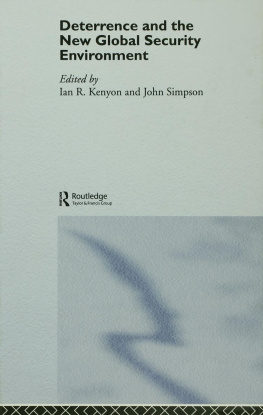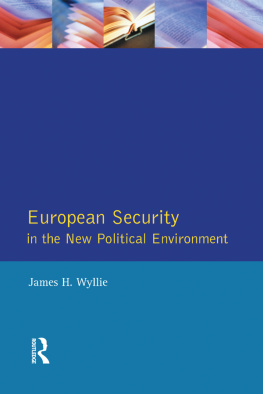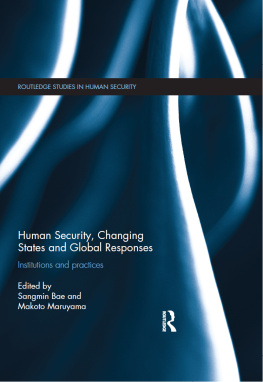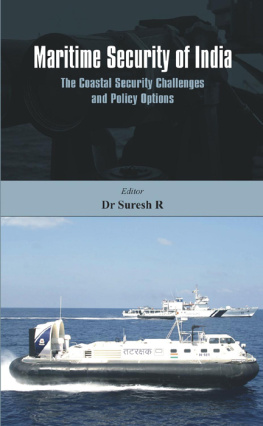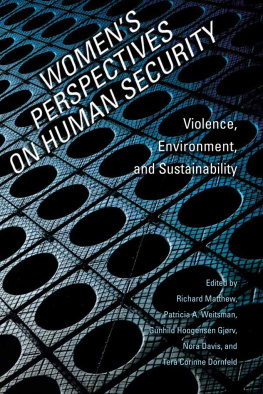A Changing Environment for Human Security
Environmental change presents a new context and new opportunities for transformational change. This timely book will inspire new ways of understanding the relationship between environmental change and human security. A Changing Environment for Human Security both supports and informs a call for new, transformative approaches to research, policy and action. The chapters in this book include critical analyses, case studies and reflections on contemporary environmental and social challenges, with a strong emphasis on those related to climate change. Human thoughts and actions have contributed to an environment of insecurity, manifested as multiple interacting threats that now represent a serious challenge to humanity. Yet humans also have the capacity to collectively transform the economic, political, social and cultural systems and structures that perpetuate human insecurities.
Fresh perspectives on global environmental change from an interdisciplinary group of international experts will inspire readers whether students, researchers, policy makers, or practitioners to think differently about environmental issues and sustainability. The contributions show that in a changing environment, human security is not only a possibility, but a choice.
Linda Sygna is a Project Leader at the Department of Sociology and Human Geography, University of Oslo, Norway.
Karen OBrien is a Professor of Human Geography at the Department of Sociology and Human Geography, University of Oslo, Norway.
Johanna Wolf is an Associate Faculty Member at Royal Roads University, Canada and Visiting Fellow at the Tyndall Centre for Climate Change Research, UK.
A Changing Environment for Human Security
Transformative approaches to research, policy and action
Edited by Linda Sygna, Karen OBrien and Johanna Wolf
First published 2013
by Routledge
2 Park Square, Milton Park, Abingdon, Oxon OX14 4RN
Simultaneously published in the USA and Canada
by Routledge
711 Third Avenue, New York, NY 10017
Routledge is an imprint of the Taylor & Francis Group, an informa business
2013 Linda Sygna, Karen OBrien and Johanna Wolf selection and editorial material; individual chapters, the contributors
The right of Linda Sygna, Karen OBrien and Johanna Wolf to be identified as author of the editorial material, and of the individual authors as authors of their contributions, has been asserted in accordance with sections 77 and 78 of the Copyright, Designs and Patents Act 1988.
All rights reserved. No part of this book may be reprinted or reproduced or utilised in any form or by any electronic, mechanical, or other means, now known or hereafter invented, including photocopying and recording, or in any information storage or retrieval system, without permission in writing from the publishers.
Trademark notice: Product or corporate names may be trademarks or registered trademarks, and are used only for identification and explanation without intent to infringe.
British Library Cataloguing in Publication Data
A catalogue record for this book is available from the British Library
Library of Congress Cataloging-in-Publication Data
A changing environment for human security : transformative approaches to research, policy and action / edited by Karen OBrien, Johanna Wolf and Linda Sygna.
pages cm
1. Human beings Effect of climate on. 2. Human security. 3. Human rights. 4. Climatic changes Social aspects. I. OBrien, Karen L.
GF71.C42 2013
ISBN13: 978-1-84971-301-6 (hbk)
ISBN13: 978-1-84971-302-3 (pbk)
ISBN13: 978-0-203-10988-5 (ebk)
This book is dedicated to Stephen Schneider (19452010)
Professor Stephen Schneider gave the keynote speech during the midsummer dinner on June 23, 2009 at the Oslo conference on Human Security in an Era of Global Change. His acknowledgement that we are not just scientists but human beings who would like to see the world a better place has inspired much of our research on environmental change and human security.
Photograph by Frank Paul Silye
Through insightful analyses of the systems, structures, paradigms, values, hopes and beliefs that underlie the ways in which we define and shape human security in a world of global change, the authors lead us to recognize our potential to deliberately drive processes of transformation towards equitable, sustainable societies. Herein lies the truly creative, essential response of the social sciences to some of the most urgent global environmental challenges and questions of our time.
Heide Hackmann, Executive Director, International Social Science Council, France
Dramatic changes require radical moves towards a sustainable and peaceful future with a human face, gender equity and environmental security. This important volume combines innovative thinking by leading environmental experts on the linkages between environmental change and human security, focusing on transformative approaches to research, policy and action. This book addresses issues of global responsibility, uncertainty, bottom up approaches to resilience, adaptation, community and gender empowerment.
Ursula Oswald Spring, National University of Mexico, Regional Multidisciplinary Research Centre, Mexico
Diverse social processes combine with global environmental change to affect human security. Inherent perceptions, beliefs, and attitudes often constrain our ability to proactively manage such changes. This well-organized, highly informative and engaging book is a balanced and sobering expose of capabilities needed to effect transformative changes essential for sustained human well-being in a fast changing environment; indeed a must-read for all thoughtful people.
Hassan Virji, Executive Director, START, USA
Helen Adams is an Associate Research Fellow at the University of Exeter where she researches the role of ecosystem services in poverty alleviation in delta environments. Helens PhD focused on migration decision-making under environmental change in Peru. She previously worked on adaptation to climate change with the OECD and the UNFCCC.
W. Neil Adger is Professor in Geography at the University of Exeter. He researches social dimensions of vulnerability, adaptation and resilience in the face of environmental change. He was an Associate of the Global Environmental Change and Human Security Programme and convenes the chapter on human security for the Fifth Assessment Report of the IPCC.
Carolina E. Adler is a geographer and environmental scientist, working as a Research Fellow at the Swiss Federal Institute of Technology in Zurich. Her PhD on climate change adaptation was awarded the 2010 Harold D. Lasswell Prize for best dissertation in policy sciences, and her research focuses on problem-oriented global environmental change, science and policy interface, and inter-transdisciplinary collaborations.
Paulina Aldunce is Assistant Professor at the University of Chile and Deputy-PI of the Human Dimensions at the Center for Climate and Resilience Research. She is a social scientist and her research interests are social and institutional dimensions of Disaster Risk Management and Adaptation to Climate Change. She has been involved as Lead Author and Review Editor for the IPCC






